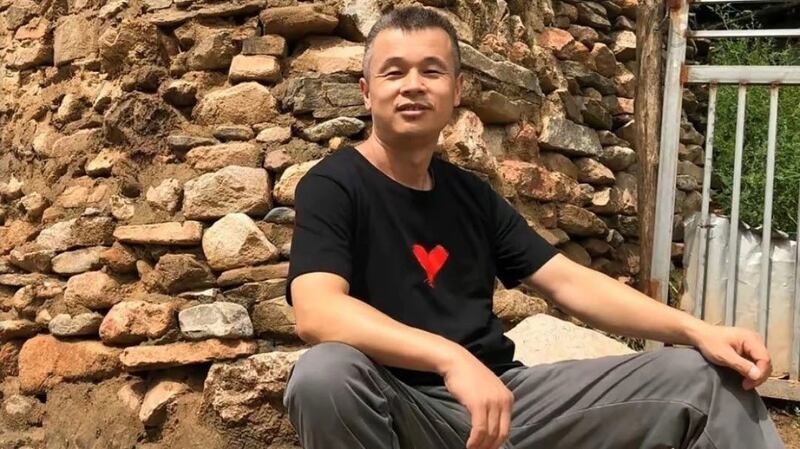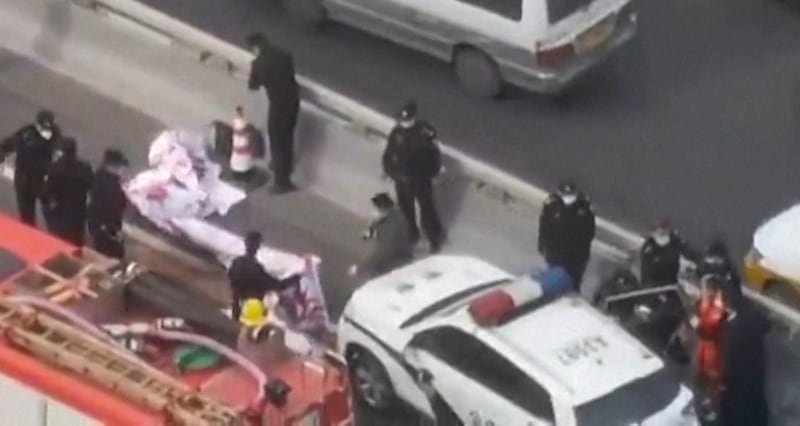One year after Peng Lifa was detained for a lone banner protest that called for Xi Jinping's resignation on Beijing's Sitong Bridge, activists in London left a banner on a bridge that read simply: "Where is Bridge Man?" while others gathered outside China's consulate in Los Angeles with banners echoing his original protest.
A flash-mob protest by the British-based dissident group China Deviants saw a large banner bearing the words "Where is Bridge Man?" and "Where is Peng Zaizhou?" – a reference to Peng's pen name – hang from the parapet of London Bridge on Saturday.
Meanwhile, protesters at a similar rally outside the Chinese consulate in Los Angeles held up banners and placards that read: "Remove the dictator-thief Xi Jinping," echoing Peng's Oct. 13, 2022 protest, and: "We are all Peng Zaizhou."
"End the Chinese Communist Party," read another.
A year after his daring show of opposition to the ruling Chinese Communist Party, Peng is still alive, although his whereabouts remain unclear. But his family are under close surveillance, according to Netherlands-based dissident Lin Shengliang, who has remained in contact with people close to Peng.

"All of his relatives, including his brother, are under house arrest and are still being monitored," Lin said. "The two daughters are picked up and dropped off [at school] by car, and all of their mobile phones have been provided for them [by the government]."
Meanwhile, police are running investigations into anyone who has had dealings with Peng's company, or that of his father-in-law.
"Everyone involved [with Peng] is implicated," Lin said.
‘Traitor-dictator’
Peng, whose pen name references an ancient essay describing the people as the water that holds up the boat of government, and might overturn it if they are unhappy with its rule, hung banners from Sitong Bridge on Oct. 13, just days ahead of the ruling Chinese Communist Party's national congress, at which Xi secured an unprecedented third term as party leader.
"Remove the traitor-dictator Xi Jinping!" read one banner, video and photos of which were quickly posted to social media, only to be deleted. A post linked from the account called for strikes and class boycotts to remove Xi.
"Food, not COVID tests. Freedom, not lockdowns. Reforms, not the Cultural Revolution. Elections not leaders," read the second, adding: "Dignity, not lies. Citizens, not slaves."

The shows of international solidarity came as U.S. congressman Chris Gallagher said he would nominate Peng for the Nobel Peace Prize, crediting him with inspiring the " white paper" protests across China just a few weeks later.
"Peng Lifa's act of courage led to the largest protests in China since Tiananmen Square – which helped to end the Chinese Communist Party’s draconian COVID lockdowns," Gallagher said in a statement on Oct. 13.
Zhou Fengsuo, executive director of Human Rights in China, welcomed the nomination.
"This is of course the highest level of support for China's resistance from the international community, and it recognizes what Peng Lifa represents – the spirit of civil resistance," Zhou told Radio Free Asia, praising Peng as "the hero of the new era."
Grabbing sand
Lin agreed, saying Peng's bridge protest had a "historical significance" because he had influenced people all over the world, as well as triggering a movement against Xi Jinping's draconian zero-COVID policy.
"What is the Chinese Communist Party afraid of? It worries that countless more like Peng Lifa will keep appearing," Lin said.
He said he didn’t believe that the Chinese government’s current war on dissent would work, however.
"It's like trying to grab sand,” he said. “The tighter you grab it, the faster the sand will leak out [through your fingers],” he said. “That sand that leaks out represents public opinion."

Former Chinese rights lawyer Liang Shaohua has written that Peng's remarks should be protected under the Chinese constitution, and that his banners didn’t constitute a crime.
Chinese rights lawyer Wu Shaoping agreed.
"I think he was exercising the most basic civil rights – his right to freedom of speech and to personal demonstration," Wu said. "[His detention] is illegal according to the Chinese Communist Party's own laws."
Peng's protest has also reverberated overseas, with his supporters reporting the harassment of their families back home, amid calls from Chinese students for a probe into his whereabouts.
Translated by Luisetta Mudie. Edited by Malcolm Foster.
